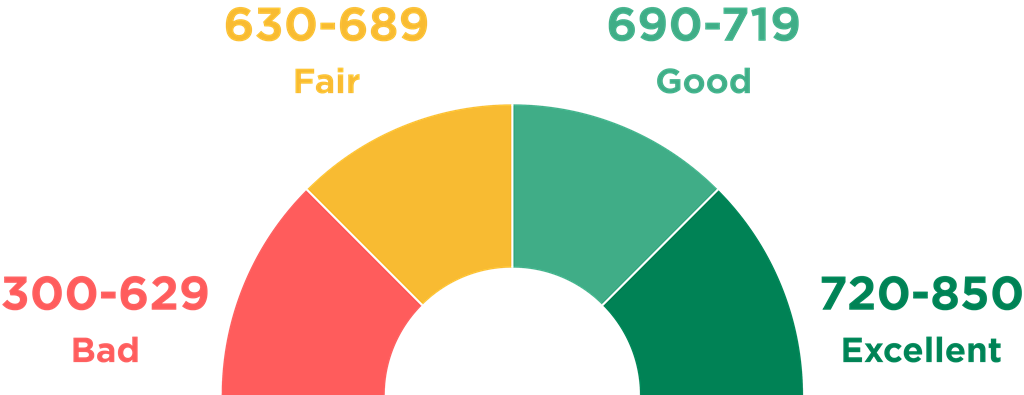
Your credit scores are determined by the information reporting in your credit reports which is an overview and history of the decisions that you have made while maintaining your credit.
Every decision you make to apply for a new account, open a credit card, pay your bills, charge your credit card, etc. impacts your credit scores and determines your ability to acquire credit in the future. This is why developing healthy habits is vital to maintaining and growing your credit scores. Ultimately, you are in control of your credit scores by managing your credit responsibly.
So, let’s take a look at some healthy habits that will ensure a higher credit score.
1. Pay your bills on-time
Paying your bills on time is the single most important factor in responsibly maintaining and improving your credit scores. One late payment can drop your credit score over 100 points so pay your bills on time – every time.
2. Maintain a low Credit Utilization
The percentage of balance that you maintain on your active credit accounts in proportion to your credit limit or high credit amount typically accounts for 30% of your credit scores. It is difficult to quickly pay down installment loans like mortgages and auto loans but, you can manage your credit card utilization. Don’t max out your credit cards, keep your credit card balances below a 20% credit utilization rate (balance/credit limit) to get the most out of your credit scores. For example, if the credit limit on your credit card is $1,000 – keep your balance at $200 or less.
3. Don’t close your oldest accounts
Length of credit history is another important factor in determining your credit scores. The longer your credit history – the better your credit scores. Length of credit history is determined in 2 parts; the age of your oldest active account and the average age of all of your active accounts. Keep growing your credit history by maintaining activity on your accounts and by not closing your oldest accounts.
4. Maintain a Mix of Credit
Lenders want to see that can be responsible for managing more than just one type of account. Maintaining a healthy mix of installment accounts (mortgage, auto loan, student loan) and revolving accounts (credit cards and department store cards) will ensure a higher credit score.
5. Limit your Inquiries
Every time you apply for credit, whether it is a credit card, department store account, auto loan, mortgage, or any other financial instrument, an inquiry is placed on your credit report as a record of your application. Having too many inquiries on your credit reports makes you look desperate for credit and throws up a red flag for lenders. Limit your applications for credit to a maximum of one inquiry every 6 months.
6. Check your credit reports
According to a study by the National Association of State Public Interest Research Groups, 79% of all credit reports contain errors. 54% contained inaccurate personal information such as misspelled names, incorrect social security numbers, wrong dates of birth, addresses, etc. 30% listed closed accounts as opened, 22% had duplicate accounts, 8% were missing a major trade-line such as a mortgage or auto loan, and most alarming, 25% contained serious errors that could cause consumers to be denied credit. On top of all that, identity theft is now the fastest growing crime in America so, check your credit reports often to make sure that the information being reported about you is 100% accurate and won’t cause you issues when applying for credit.
7. Protect your personal information
As already mentioned above, Identity Theft is now the fastest growing crime in America. With recent breaches to Equifax, Saks Fifth Avenue, Orbitz, Yahoo, LinkedIn, AOL, among others – you can rest assured that your private information is out there on the dark web. Be diligent about checking your credit reports of any unauthorized inquiries or accounts, check your credit card statements for any suspicious charges, change your passwords every 6 months, don’t use the same password for all of your accounts, use 2 factor authentication when available, get a shredder and don’t open any suspicious emails, click any suspicious links, or download any suspicious files. Be safe, be diligent and protect your identity and personal information.
8. Don’t Co-Sign for anyone
This is a tough one because it’s human nature for us to help those close to us but, we have seen so many cases where credit scores were ruined because of a co-signed loan. If the person you’re co-signing for needs a co-signer it probably means that they have not done a good job of maintaining their credit responsibly. Unforeseen circumstances like a job loss, medical issue, or personal problems can derail not only your credit but, also your friendship. So unless you’re ready and willing to take over 100% of the payments and responsibility on the loan, if the person you’re co-signing for can’t meet the financial obligation, don’t co-sign. Protect your credit for yourself and your family.
9. Maintain an Emergency Fund
Maintaining a 3-6 month emergency reserve can save your credit and help you overcome financial difficulties brought on by job loss, medical issues, natural disasters, or relationship problems. It’s easier said than done but, start by opening up a separate bank account and designating it as your emergency fund, then, put aside 5%-10% of your income into that fund every month until you have a 3-6 month reserve to live off in case of an emergency.




